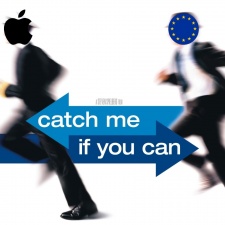I didn’t quite have ‘Apple takes inspiration from Unity’s Runtime Fee’ that took down its CEO and left developers furious on my 2024 games industry bingo card, but here we are.
Apple has unveiled a litany of new rules for the App Store and its iOS ecosystem as it looks to escape the clutches of the European Union’s Digital Markets Act. The new regulations are designed to identify ‘gatekeepers’ – large online platforms – and create a “fairer business environment”.
The European Commission states this means gatekeepers, of which Apple is one, must:
- Allow third parties to inter-operate with the gatekeeper’s own services in certain specific situations
- Allow their business users to access the data that they generate in their use of the gatekeeper’s platform
- Provide companies advertising on their platform with the tools and information necessary for advertisers and publishers to carry out their own independent verification of their advertisements hosted by the gatekeeper
- Allow their business users to promote their offer and conclude contracts with their customers outside the gatekeeper’s platform
Examples of what gatekeepers can no longer do include:
- Treat services and products offered by the gatekeeper itself more favourably in ranking than similar services or products offered by third parties on the gatekeeper’s platform
- Prevent consumers from linking up to businesses outside their platforms
- Prevent users from un-installing any pre-installed software or app if they wish so
- Track end users outside of the gatekeepers’ core platform service for the purpose of targeted advertising, without effective consent having been granted
For Apple, part of this effectively means opening up to alternative payment systems and third-party marketplaces. As we’ve already seen in the U.S. from its lawsuit with Epic Games, Apple has no intention of loosening its grip on iOS and lowering its fee.
As soon as the champagne was popped when the ruling to enable links to web stores was effectively upheld, Apple slapped a 27% charge on purchases within seven days through those same links. (As an aside – does Apple effectively then own those users indefinitely for purchases they make on an external store? Its terms state it will take a share of subsequent subscription renewals from web shops.)
Knock Knock
Apple’s new rules for the EU are as lengthy as they are confusing. Publishers can choose to keep the existing deal they have with the App Store, or move over to new business terms, which includes a ‘Core Technology Fee’. We explain many of the rules here, but some highlights include:
- Apple will lower its revenue share to 17%, rising by an additional 3% if publishers use an alternative payment method
- Apple will charge €0.50 per install over one million downloads on an annual
- Third-party stores need €1 million in credit as security for users
- Third-party stores will be charged €0.50 per first install on an annual basis
The proposals completely upend the economics of mobile and the entire marketing process. App tracking transparency (and now privacy manifests) have already rocked the foundations of the mobile games industry, and adding fresh install charges would potentially otherwise be a killing blow were publishers to adopt the new terms. Mobile Dev Memo’s Eric Seufert says the Core Technology fee will be applied yearly on new installs, all reinstalls, and updates, effectively becoming a yearly fee per user.
It’s no wonder web shops were the talk of the show at Pocket Gamer Connects London this week. Publishers want out.
Unity’s Runtime fee was controversial because it slapped on a fee for free downloads that is unrelated to earnings. While developers have a choice here – unlike in Unity’s initial announcement – it compounds the fact that spending players are already harder and consequently more expensive to find.
And if you just wanted to release a free app or if you launched a great game with poor monetisation that goes viral? One million installs (over the first 1m threshold) could cost you €500k.
Open a highly successful marketplace to compete with the App Store? The same result ensues. The fact that it potential combines with Unity’s Runtime Fee compounds the issue. With platform holders, tools and services companies constantly squeezing developers for money to forever grow their own revenues, the system eventually starts to break.
Apple has seen publishers across games and non-gaming apps flee to their own web shops and payment providers – but not currently to other marketplaces. So why not slap a fee on downloads, as well as keep revenue share? In this case, Apple can have its cake and eat it.
Who knows how regulators in the EU will react to this new scheme, though the European Commission has shown it’s serious about taking on big tech companies. Whatever happens, Apple has shown it won’t go down without a fight, and is willing to change the rules of the game each time it faces a challenge to ensure the house always wins.
And in the meantime, developers and publishers get to suffer in an ever-increasingly hostile market.
It’s no wonder web shops were the talk of the show at Pocket Gamer Connects London this week. Publishers want out.

